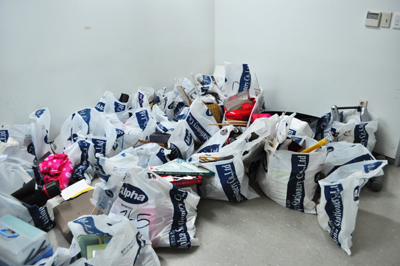
The Ewha Centennial Library is equipped with public lockers under the management of the Student Government Association (SGA), which students can use regardless of their majors. Before the start of each semester, SGA demands ex-locker users to empty their lockers as soon as possible. This semester, SGA declared that it would not store ex-users’ valuables anymore. However, despite this announcement, lots of lockers were not vacated.
According to a member of the SGA, some students who used lockers during summer school failed to return their keys. Other students who returned keys keep using unlocked lockers without the permission of the SGA.
“As the ex-user did not empty the locker, it was filled with her stuff such as notes and a toothbrush,” Shin Soo-jee (Economics, 2) said. “I had to carry heavy books around for at least four days.”
All the materials belonging to the ex-locker users should have been discarded, based on this year’s SGA policy, but items are being kept in the SGA’s room since there were lots of valuables.
“We have to empty all lockers for the next users,” Ryu Ea-seul (Political Science, 4), the president of SGA, said. “Even if it is a policy to discard ex-users’ items, we cannot easily throw away things such as laptop computers or books related to users’ majors.”
In the case of the public lockers in the Ewha Campus Complex, each user pays a 10,000-won deposit before use. If users do not empty lockers within a week after the expiration date, their articles can be thrown away without additional warning, and the deposit will be used to replace locker keys.
“Even if we pressure students through phone calls and text messages each semester, some previous users empty their lockers in given period, while about 40 ex-users do not pick up their articles,” An Yoon-jin, a staff member in the Office of Student Affairs, said. “Students’ observance of relevant regulations can prevent additional exhausting tasks such as moving ex-users’ stuff.”
Unlike public lockers, private lockers are managed by the student councils of each college and department. Still, the situation with private lockers is not hugely different from public ones.
This semester, the student council for the department of Architecture Design changed its policy on lockers. The previous policy was that if students are assigned lockers once, they use them until they graduate. However, after the council changed the rule and reassigned the lockers to students year-by-year, the council had to store ex-locker users’ leftover belongings temporarily. Also during the process of changing the policy, the council imposed a fine on students who did not vacate lockers on time or who lost the locker keys.
The student council of the department of English Language and Literature went through similar troubles with managing lockers.
“When disposing of ex-users’ articles, we always struggle to break a lock and carry away the things by ourselves,” said Kim Su-young (English, 3), the student representative of the department of English Language and Literature. “Students’ voluntary cooperation is desperately needed.”
Some students consider this strict policy on lockers as fair.
“If the SGA allow exceptions on locker usage, the incoming users can be inconvenienced,” Ko Yae-hee (Business, 3) said. “Even if the SGA might seem unsympathetic, it seems to be fair to empty lockers even by force as ex-locker users do not meet the deadline.”
Kim Jin-ah
jakim90@ewhain.net

